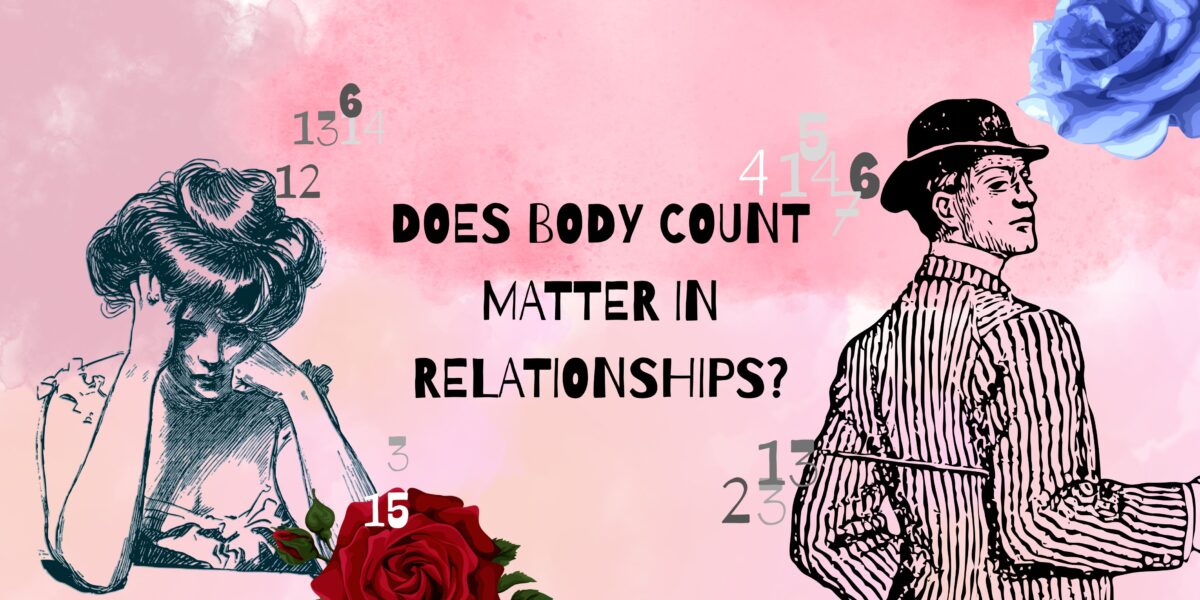In today’s society, casual sex is no longer as big of a taboo as it once was. As a result, there seems to be greater acceptance towards it. Moreover, various sexual terms have also entered common speak.
Nevertheless, the actual act of intercourse is still divisive. An example here is of the taboo around kinks and casual sex.
In a similar vein as casual sex, body count also remains a controversial part of sexual life. In this article, I will be going over some of the ways by which body count affects relationships.
But first of all – let’s define what body count is.
What is Body Count?

Body count is the number of people an individual has had sex with. Body count could be counted in the people one has had sex with inside relationships, commitments, or casual affairs or flings. However, mostly, a higher count is associated with more casual sex as commitments, marriages or long-term relationships involve sex with the same person over longer spans of time.
Having said that, it is possible to have a higher body count even if you only prefer long-term relationships. For example, if you have had multiple physically intimate commitments, you could have a higher body count.
Historically, casual sex has been perceived negatively by most societies. Thus, the dominant view of those with a higher body count is a negative one. Here, stereotypes that relate to gender also come into play.
For example, the stereotype that females with a higher body count have low self-esteem – as we will see later on – has not been backed by research.
The truth is that the emotional and psychological meaning of this number is subjective. It can differ from person to person and from culture to culture. Moreover, new research has shown ways how body count affects expectations for relationships, attachment, partner dynamics, and self-perception.
Firstly, we’ll take a deep dive into how body count affects one’s own self in relationships.
How Does Body Count Affect the Self in Relationships?

Many people’s self-concept is linked to the number of sexual partners they have. It can influence how people see themselves inside of romantic or sexual relationships. Firstly, the actual number of sexual partners can influence one’s self. On the other hand, these sexual experiences and how positive or negative they have been can also have a significant affect. For example, if one’s experiences have largely gone against their personal values, a higher body count could affect their self-perception more negatively.
However, one thing is certain; traditional narratives that link a large body count to poor mental health are not exactly backed by recent research. The idea that frequent casual sex inevitably denotes or causes poor self-worth by itself has been disproven by Walldén et al. (2024). The researchers found no discernible difference in self-esteem between women with high and low levels of casual sexual involvement.
But to say that there is no link at all is also a fallacy. Let’s see how.
Body Count and Self-Esteem
In public discourse, sexual conduct and self-esteem have long been associated. There is the case that the influence of casual sex on mental health and self-esteem is determined by the motivations behind it rather than the quantity of partners (Townsend et al., 2020). For example, individuals who had sex for self-expression or personal satisfaction reported better psychological results.
Contrastingly, those who had sex to win acceptance or prevent rejection reported poorer self-esteem and greater levels of sadness.
In a similar vein, Vrangalova (2021) highlighted that casual sexual conduct did not cause psychological harm to those who were comfortable with casual sex.
Nonetheless, there was more unhappiness among individuals with more conservative views who continued to have casual sex.
So, personal views and values deeply influence how sexual conduct affects one’s emotions.
Body Count and Attachment Style
How a person attaches with their partner is a crucial determinant of self-conceptions based on body count. The three types of attachment styles—secure, anxious, and avoidant—have a significant impact on how people establish and preserve relationships. While these styles originate from early childhood, they can change because of experiences.
Regular casual sex, especially with strangers or acquaintances, is linked to higher levels of avoidant attachment over time (Reyna et al., 2015). This suggests that emotional detachment and discomfort with closeness can increase over time through repeated emotionally detached sexual interactions.
Avoidant attachment also plays a part in the manifestation of childhood maltreatment through a higher body count in adolescents. According to Raby (2017), there is a reciprocal relationship between insecure attachment and casual sexual conduct, which might strengthen avoidance and detachment.
There are some conflicting findings too. For example, emotionally satisfying sex in committed partnerships can improve attachment security (Birnbaum et al., 2006). So, while one might have a higher body count in the context of healthy, committed relationships, the overall effect on one’s attachment style would be positive.
Therefore, context and emotional ties have a greater impact than the number of partners.
Body Count and Personal Beliefs
How people view their own sexual past is influenced by what they believe their sex-related beliefs and attitudes. Culture, religion and family traditions usually play an important part in building one’s beliefs. These beliefs can result in whether someone is ashamed of their body count or feels empowered by it.
This is evident in how people with limited sociosexuality (those who preferred sex in committed partnerships) who had casual sex were more likely to feel regret and psychological distress (Vrangalova & Ong, 2014). One reason for this, Lefkowitz and Gillen (2006) note, is that the internal contradiction between action and personal values can result in poorer emotional well-being and higher suffering.
Additionally, people with strong moral or religious beliefs were more likely to feel sexual shame and cognitive dissonance if they had casual sex, according to Grubbs et al. (2020). As a result, a person’s emotional reaction is frequently determined by their beliefs rather than by having sex.
So, we can understand that the context of a person’s thoughts, attachment styles and relationships is indispensable in how body count affects one’s self.
However, does body count also affect your partner in the relationship?
How Does Body Count Affect Your Partner?

Individual beliefs, emotional development, and relationship objectives are important parts where partners connect with each other. So, depending on them, reactions to a partner’s body count might differ significantly. A higher body count may be interpreted as a warning sign or cause of insecurity by some, while others remain unconcerned.
Here as well, research shows a nuanced view.
Body Count and Partner’s Personality
Personality is a collection of enduring patterns of behavior and attitudes. Naturally, one’s longstanding behaviors and unconscious preferences can greatly impact how they react to their partner’s body count.
Research consistently shows that Big Five personality traits shape how people experience and engage with sex—and how they perceive a partner’s sexual history. A meta-analysis by Allen and Walter (2019) of 137 studies found that extraversion correlates with greater sexual activity and risk-taking, while openness relates to liberal sexual attitudes and varied experiences. Neuroticism tends to heighten sexual dissatisfaction, and higher agreeableness or conscientiousness is linked to less infidelity and more relational stability.
In practical terms, a partner high in openness or extraversion may be less judgmental about past sexual history, while someone high in neuroticism may experience more insecurity. Those with high conscientiousness or agreeableness might value fidelity and be more accepting of a partner’s past when it aligns with relational trust.
This would mean that if an individual generally is open to considering new values and experiences plus they experience fewer negative emotions – they will not mind a higher body count. But if this is not the case – a higher body count generally does irk partners.
Nevertheless, there are other aspects of an individual which play a huge role in their reaction to their partner’s body count.
Body Count and Partner’s Morality
Moral judgment is a clear example of another important factor which can in fact tint your partner’s reaction. Weeden and Kurzban (2013) note that moral beliefs about sex frequently serve as stand-ins for enduring mating preferences. A high body count may be interpreted as an indication of incompatibility or a lack of commitment potential by those who value sexual exclusivity or virginity.
Furthermore, gendered double standards still exist. Men are frequently commended for their sexual experiences while women are harshly condemned (Armstrong et al., 2012), a dynamic that continues to affect how partners understand one another’s pasts. In other words, if it is a female with a higher body count, there is a higher chance that the partner would not be up in arms about it, in a heterosexual relationship.
Body Count and the Nature of the Relationship
The kind of relationship that you have matters. For example, body count does not matter as much in casual or open relationships. However, it could raise more serious concerns about compatibility, values, and long-term objectives in commitments or long-term relationships.
There are still ways, however, to mitigate effects of a higher body count in long-term romantic relations.
Sprecher and Hendrick (2004) vouch for mutual self-disclosure, including disclosing one’s sexual past. can lead to greater closeness and relationship satisfaction. This implies that relationships may be strengthened, and trust can be fostered by having open and honest conversations regarding body count, regardless of the number.
Conclusion
Body count is a complicated and sometimes misinterpreted aspect of relationships and one’s identity. Despite common misconceptions, a higher body count does not always translate into a trainwreck of a partner or relationship. Rather, attachment patterns, societal and moral ideas, and individual motivations influence the health of the relationship.
Perhaps, we forget that numbers alone are not as important as autonomy, permission, emotional context, and alignment with personal beliefs. Furthermore, rather than reflecting the objective facts, a partner’s response to a person’s sexual past frequently reflects their own emotional framework.
In the end, body count ought to be one aspect of a broader discussion in relationships. While it certainly can affect them, this need not be an unsurmountable bone of contention.
After all, healthy relationships are based on empathy, communication, and respect. One’s sexual past can be an important component.
But it is still just one aspect of a relationship.
References
- Allen, M. S., & Walter, E. E. (2018). Linking big five personality traits to sexuality and sexual health: A meta-analytic review. Psychological Bulletin, 144(10), 1081–1110.
- Armstrong, E. A., England, P., & Fogarty, A. C. K. (2012). Orgasm in College Hookups and Relationships. American Sociological Review.
- Birnbaum, G. E., Reis, H. T., Mikulincer, M., Gillath, O., & Orpaz, A. (2006). When sex is more than just sex: attachment orientations, sexual experience, and relationship quality. Journal of personality and social psychology, 91(5), 929.
- Lefkowitz, E. S., & Gillen, M. M. (2006). “Sex Is Just a Normal Part of Life”: Sexuality in Emerging Adulthood. Journal of Adolescent Research.
- Grubbs, J. B., Kraus, S. W., Perry, S. L., Lewczuk, K., & Gola, M. (2020). Moral incongruence and compulsive sexual behavior: Results from cross-sectional interactions and parallel growth curve analyses. Journal of Abnormal Psychology, 129(3), 266–278.
- Raby, K. L., Labella, M. H., Martin, J., Carlson, E. A., & Roisman, G. I. (2017). Childhood abuse and neglect and insecure attachment states of mind in adulthood: Prospective, longitudinal evidence from a high-risk sample. Development and psychopathology, 29(2), 347-363.
- Reyna, C., & Wilks, C. (2015). The Influence of Casual Sex on Future Relationship Styles. Journal of Sex Research.
- Sprecher, S., et al. (2004). Self-disclosure in Intimate Relationships: Associations With Individual and Relationship Characteristics. Journal of Social and Clinical Psychology.
- Townsend, J. M., et al. (2020). Associations Between Motives for Casual Sex, Depression, Self‐Esteem, and Sexual Victimization. Archives of Sexual Behavior.
- Vrangalova, Z. (2021). Who Benefits from Casual Sex? The Role of Sociosexuality. Sexuality Research and Social Policy.
- Vrangalova, Z., & Ong, A. D. (2014). Who Benefits From Casual Sex? Social Psychological and Personality Science.
- Walldén, A., et al. (2024). Is There a Kernel of Truth to the Stereotype That Women Who Engage in Casual Sex Have Lower Self-Esteem? Personality and Individual Differences.
- Weeden, J., & Kurzban, R. (2013). What Predicts Religious Beliefs and Feelings? Evolution and Human Behavior.
I am a Clinical Psychologist and a Lecturer of Psychology at Government College, Renala Khurd. Currently, I teach undergraduate students in the morning and practice psychotherapy later in the day. On the side, I conjointly run Psychologus and write regularly on topics related to psychology, business and philosophy. I enjoy practicing and provide consultation for mental disorders, organizational problems, social issues and marketing strategies.

